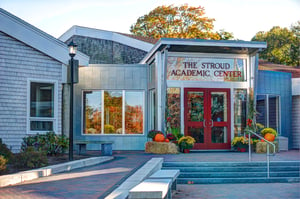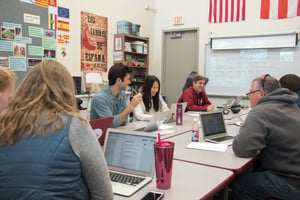 Everything we do at Tabor moves us closer to our mission, and both a lifelong love of learning and care for others and committed citizenship were pursued with gusto by our faculty this summer.
Everything we do at Tabor moves us closer to our mission, and both a lifelong love of learning and care for others and committed citizenship were pursued with gusto by our faculty this summer.
Education used to be about teaching people some thing. Now, it’s about helping students develop a reliable compass and the navigation skills to find their own way through an increasingly uncertain, volatile, and ambiguous world. Today, learning is the work – and while it is easy to learn, we need to become better at unlearning and relearning. Education is becoming more about ways of thinking – that is, ways of learning – involving creativity, critical thinking, problem solving, and decision making. It is about ways of working, including communication and collaboration; about tools for working, and that includes not only the capacity to use technology or soft skills but also to recognize their potential for new ways of making meaning and advancing citizens and society. We faculty, as lead learners of this learning entity of Tabor Academy, need to possess these skills and sensibilities before we can offer them to others.
 With 43% of our faculty pursuing professional growth opportunities this summer (click here to read about that vast array), we are well positioned to model and implement for our students the practices of learning how to learn and of transferring learning to new contexts, real challenges, and consequential citizenship. What follows is a summary of the recurring themes, lingering questions, and new pursuits for 2018-19 school year of faculty from their summer reflections:
With 43% of our faculty pursuing professional growth opportunities this summer (click here to read about that vast array), we are well positioned to model and implement for our students the practices of learning how to learn and of transferring learning to new contexts, real challenges, and consequential citizenship. What follows is a summary of the recurring themes, lingering questions, and new pursuits for 2018-19 school year of faculty from their summer reflections:
“Specific feedback for a student results in more enduring learning than a grade. High quality feedback moves learning forward.”
“Grades stop learning, while comments and feedback fuel a growth mindset in students.”
“If I can’t finish the sentence, ‘The purpose of this assignment is….’ in a succinct manner, I should rethink the value of assigning homework that night.”
“Learning which common practices I’ve employed over the years with students that run counter to research will forever change the way I develop curriculum, craft lessons, and plan practices.”
“Just because I ‘taught’ something doesn’t mean students have learned it. If they haven’t learned, then I haven’t actually taught.”
“It’s imperative to connect material – both skills and content – to students’ lives. The more often class intersects with their lives, the deeper their understanding of its value becomes.”
“We should run meetings, whether with students or adults, like we run our classrooms: with learning processes and learning outcomes in mind. I will try this with both my dorm and my coaching responsibilities.”
“All learning requires real risk and vulnerability. Students need to know when I am trying something new or when I feel unsure in my learning so they know it is ok for them to feel likewise.”
“Who is school for? The kids! Why school? To cultivate student empowerment today for agency tomorrow. What’s my role? Be a trestle!”
“Continuing to hire and retain a diverse group of faculty members is critical, especially in a boarding environment, so that students of all backgrounds can see themselves within our faculty. This diversity in our community will result in dynamism from our community.”
“Listening to the conundrums of other schools in the realm of student life validated that we are on the right track and making tremendous gains in important areas.”
“I learned the criticality of getting to know my students and to learn about their values and backgrounds – to see their “invisible qualities.”
“Much of what we have learned about writing is formulaic, and formula is a death sentence for creativity.”
“Of course, students’ grades and academic success are vital, but our students have so much going on in their lives beyond the classroom. They need us to consider the entire iceberg, not just the tip.”
“The alumni who are uninvolved, the students who do not feel empowered to step out of their comfort zone or do not feel proud of who they are, the students who feel like they don’t belong here – those are the people for whom equity and inclusion work is most important.”
“Traveling and learning in a new culture with a different language reminded me that no matter how busy I am or how frazzled I might be with all that serving a boarding school requires, I always have time for a kind word and gracious gesture for a student or family that has traveled around the world to see us.”
And, finally: “Saying a conference is good is like saying a trip to the market is a good meal. Unless we are able to take what we have learned and “cook the meal” for students and colleagues, it truly was not a worthwhile experience.”
So, with a bountiful summer of study and learning as ingredients, the entire Tabor community – across all areas of school life – will be well served this year. Enjoy!









